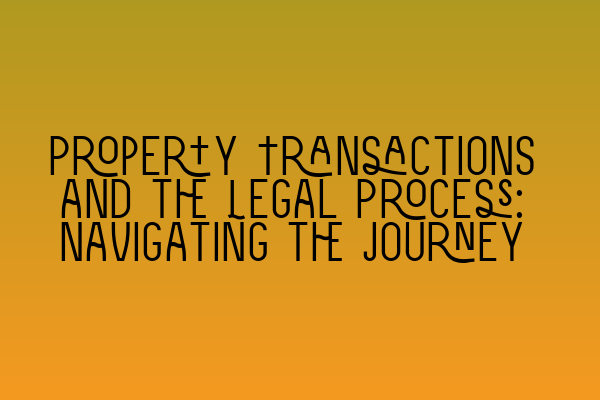Property Transactions and the Legal Process: Navigating the Journey
Buying or selling a property can be a complex and daunting process, but with the right guidance and understanding of the legal aspects involved, it can be a smooth and successful journey. In this article, we will explore the various stages of a property transaction and the legal processes that come into play.
The Initial Stage: Pre-Contractual Negotiations
Before committing to a property transaction, it is important to conduct thorough research and due diligence. This includes analyzing market trends, surveying the property, and obtaining legal advice from experienced property solicitors.
During this stage, negotiations take place between buyers and sellers to determine the terms and conditions of the transaction, including the sale price, payment terms, and any special conditions or contingencies. It is crucial to ensure that all negotiations are properly documented and legally binding.
Once the negotiations are finalized, it is time to move on to the next stage of the legal process: the contract stage.
The Contract Stage: Drafting and Exchange
The contract stage is a critical phase in a property transaction as it involves the drafting and exchange of legal documents. These documents outline the rights and obligations of both the buyer and seller and set out the terms of the agreement.
At this stage, it is essential to engage the services of a qualified property solicitor who will meticulously review the draft contract, perform property searches, and ensure that all legal requirements are met. This includes examining the legal title, checking for any encumbrances or restrictions on the property, and verifying the seller’s ownership rights.
Once all parties are satisfied with the terms of the contract, the next step is to exchange contracts. This is typically done through the respective solicitors who ensure that both parties have signed identical copies of the contract. Upon exchange, the transaction becomes legally binding, and both parties are obliged to proceed with the sale/purchase.
The Completion Stage: Handover and Transfer of Ownership
Completion is the final stage of a property transaction where the ownership of the property is transferred from the seller to the buyer. This stage involves various tasks, including the transfer of funds, the registration of the transaction with the Land Registry, and the physical handover of keys.
Prior to completion, the buyer’s solicitor will conduct final checks to ensure that all necessary payments have been made, all necessary documents are in order, and all legal formalities have been fulfilled. They will also arrange for the payment of Stamp Duty Land Tax (SDLT) and any other applicable fees.
On completion day, funds are transferred, and the seller’s solicitor will confirm that they have received the full payment. The buyer’s solicitor will then register the change of ownership with the Land Registry, ensuring that the buyer’s interest in the property is officially documented.
Post-Completion: Aftercare and Legal Obligations
After completion, there are still important legal obligations that need to be fulfilled. These include updating the property’s ownership details with relevant authorities, notifying utility providers, and arranging for insurance coverage. Additionally, if the property is subject to any existing tenancy agreements, the buyer will need to respect and manage them accordingly.
It is advisable to consult with a property solicitor post-completion to address any legal queries or concerns that may arise. They can provide guidance on ongoing legal obligations and ensure that all necessary steps are taken to protect the buyer’s interests.
Conclusion
Property transactions involve a complex and multifaceted legal process. Navigating through each stage requires careful attention to detail, thorough research, and the support of a qualified property solicitor.
If you are planning to buy or sell a property, it is crucial to seek professional advice and assistance from experienced property solicitors who specialize in property law and land law. They will guide you through the process, protect your interests, and ensure that the transaction is conducted in compliance with all legal and regulatory requirements.
For more information about preparing for the SQE exam or taking SQE practice exams, please visit the following links:
